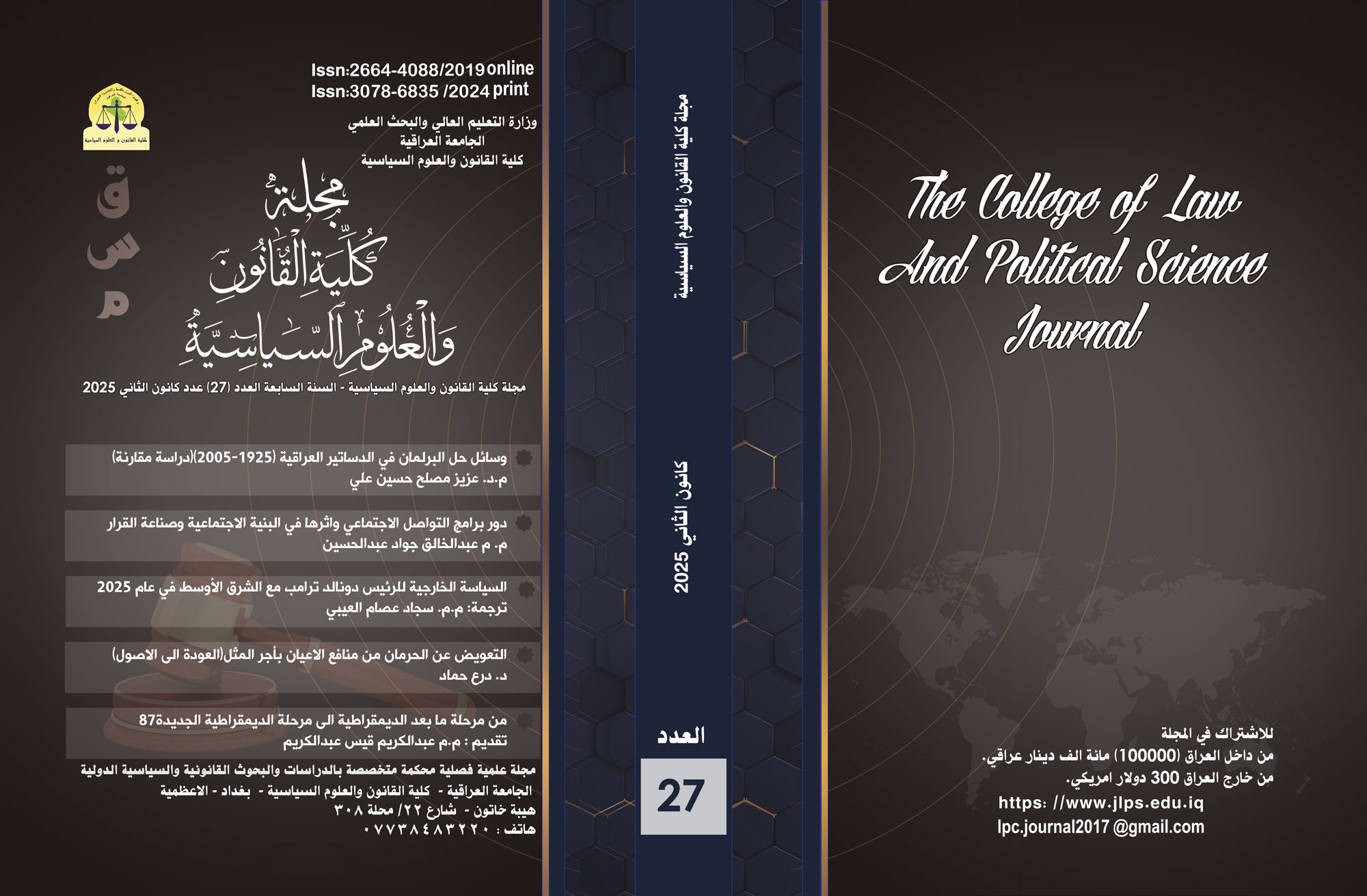وسائل حل البرلمان في الدساتير العراقية (1925-2005)(دراسة مقارنة)
DOI:
https://doi.org/10.61279/ba96ez98الكلمات المفتاحية:
البرلمان العراقي, حل البرلمان العراقي, السلطة التنفيذية , اهم وسائل الحل, آليات وطرق دستورية في حل البرلمانالملخص
القواعد الدستورية لأغلب الدول تعطي اختصاصات متبادلة للسلطتين التنفيذية والتشريعية الهدف من ورائها هو تحقيق التوازن بين هذه السلطات، وتحرص الدساتير دوما على تنظيم العلاقة وخلق التوازن بين السلطات القائمة في هذه الدولة، وهذا ما يميز النظام البرلماني عن غيره من حيث هناك توازن وتعاون بين السلطتين التشريعية والتنفيذية. ومن اجل الضمان عدم انحراف السلطة التشريعية المنتخبة من قبل الشعب في ممارسة وظائفها الدستورية، ولمواجهة السلطة التشريعية بأداة مضادة لما تملكه تلك من اختصاصات تشريعية وحق سحب الثقة من الحكومة، ومن الطبيعي ان يمارس البرلمان اعماله وفقا لما يحدده الدستور في فترة زمنية محدده، الا انه يمنح السلطة التنفيذية هذا الاختصاص فباستطاعتها ان تقوم بحل البرلمان حيث يعد حق الحل بمثابة السلاح المتبادل او المقابل لسلاح المسؤولية الوزارية امام البرلمان وربما قد تجد السلطة التنفيذية نفسها مضطرة لاستخدام وسيلة الحل في حال عدم الوصول إلى توافقات أو تفاهمات مع السلطة التشريعية، فحل السلطة التشريعية يعد أخر المطاف واقوى الأسلحة التي تمتلكها السلطة التنفيذية في مواجهة ما تمتلكه السلطة التشريعية.
التنزيلات
المراجع
الدستور العراقي النافذ 2005 / المادة 67 .
بشير علي باز، المصدر السابق، ص74.
جهاد زهير ديب الحرازين:- مصدر سابق ، ص 95.
حسن الحسن:- القانون الدستوري والدستور في لبنان ، ط 1 ، بيروت، سنة 1959 ، ص 25.
حميد حنون خالد:-القانون الدستوري ، نفس المصدر ، ص 388 .
حميد خالد : مصدر السابق ، ص 389.
ساجد محمد الزاملي، مبادئ القانون الدستوري والنظام الدستوري في العراق، دار نيبور للطباعة والنشر والتوزيع، الديواني، 2014 ص4.
صالح جواد الكاظم ، د. علي غالب العاني:- المصدر السابق ، ص 72 وما بعدها.
صالح جواد الكاظم ود. علي غالب العاني ، الانظمة السياسية ، مطبعة دار الحكمة ، بغداد 1991 ص72.
عادل الطبطبائي، الرقابة السياسية على أعمال الحكومة خلال فترة حل البرلمان، بحث منشور في مجلة الحقوق، مجلس النشر العلمي، جامعة الكويت، السنة الخامسة عشرة، العدد الثاني / الثالث / الرابع، ،1991 ص13.
عبد الرحمن البزاز، العراق من الاحتلال حتى الاستقلال، ط ،3 مطبعة العاني، بغداد، 1967 ص275.
علاء احمد عبد المتعال، حل البرلمان في الأنظمة الدستورية المقارنة، أطروحة دكتوراه، جامعة بيروت العربية 1996.
علي يوسف الشكري ، رئيس الجمهورية في العراق رئيس في نظام برلماني أم رئاسي، بحث منشور في مجلة كلية الفقه، جامعة الكوفة، كلية الفقه، العدد الرابع 2007 ص15.
فؤاد العطار ، النظم السياسية والقانون الدستوري ،ج ١ ، في تطور الفكر السياسي(دار النهضة العربية) ، 1965 ، ص 345 .
فؤاد العطار، مصدر نفسة.
محمد انس قاسم جعفر، النظم السياسية والقانون الدستوري، دار النهضة العربية ، 1999 ، ص 366 .
مسلم، خالد عبد، حق الحل في النظام النيابي البرلماني، مصدر سابق، ص352
مصطفى عفيفي:- النظرية العامة للقانون الدستوري الكويتي .
مها بهجت يونس الصالحي، المصدر السابق، ص53 – 54.
يحيى الجمل ، الأنظمة السياسية المعاصرة، دار النهضة العربية القاهرة، بدون تاريخ طبع ص 176.
الموقع الالكتروني www. Adelamer.com المصدر السابق .
الموقع الإلكترونيwww.adelamer.com حل البرلمان في العراق: د. عادل عامر, نشر بتاريخ 4 / 11 / 2015.
References
The current Iraqi Constitution of 2005 / Article 67.
Bashir Ali Baz, the previous source, p. 74.
Jihad Zuhair Deeb Al-Harazin: - Previous source, p. 95.
Hassan Al-Hassan: - Constitutional Law and the Constitution in Lebanon, 1st ed., Beirut, 1959, p. 25.
Hamid Hanoun Khaled: - Constitutional Law, the same source, p. 388.
Hamid Khaled: Previous source, p. 389.
Sajid Muhammad Al-Zamili, Principles of Constitutional Law and the Constitutional System in Iraq, Dar Nibur for Printing, Publishing and Distribution, Al-Diwani, 2014 p. 4.
Saleh Jawad Al-Kadhim, Dr. Ali Ghaleb Al-Ani: - Previous source, p. 72 and following.
Saleh Jawad Al-Kadhim and Dr. Ali Ghaleb Al-Ani, Political Systems, Dar Al-Hikma Press, Baghdad 1991, p. 72.
Adel Al-Tabtabaei, Political Oversight of Government Actions During the Period of Parliament Dissolution, a research published in the Journal of Law, Scientific Publication Council, Kuwait University, Fifteenth Year, Issue Two/Third/Four, 1991, p. 13.
Abdul Rahman Al-Bazzaz, Iraq from Occupation to Independence, 3rd ed., Al-Ani Press, Baghdad, 1967, p. 275.
Alaa Ahmed Abdul Muttal, Dissolution of Parliament in Comparative Constitutional Systems, PhD Thesis, Beirut Arab University 1996.
Ali Youssef Al-Shukri, The President of the Republic in Iraq, President in a Parliamentary or Presidential System, a research published in the Journal of the College of Jurisprudence, University of Kufa, College of Jurisprudence, Issue Four 2007, p. 15.
Fuad Al-Attar, Political Systems and Constitutional Law, Vol. 1, in the Development of Political Thought (Dar Al-Nahda Al-Arabiya), 1965, p. 345.
Fouad Al-Attar, same source.
Muhammad Anas Qasim Jaafar, Political Systems and Constitutional Law, Dar Al-Nahda Al-Arabiya, 1999, p. 366.
Muslim, Khaled Abdul, The Right to Dissolution in the Parliamentary System, previous source, p. 352.
Mustafa Afifi: - The General Theory of Kuwaiti Constitutional Law.
Maha Bahjat Younis Al-Salihi, previous source, pp. 53-54.
Yahya Al-Jamal, Contemporary Political Systems, Dar Al-Nahda Al-Arabiya, Cairo, no date of publication, p. 176.
Website www.Adelamer.com previous source.
Website www.adelamer.com Dissolving Parliament in Iraq: Dr. Adel Amer, published on 11/4/2015.
منشور
إصدار
القسم
الفئات
الرخصة
الحقوق الفكرية (c) 2025 مجلة كلية القانون والعلوم السياسية

هذا العمل مرخص بموجب Creative Commons Attribution-NonCommercial-NoDerivatives 4.0 International License.





